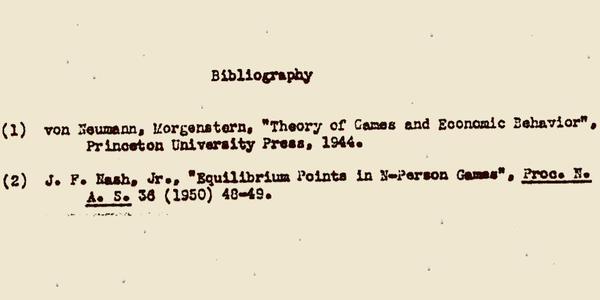When John Nash wrote “Non Cooperative Games,” his Ph.D. dissertation at Princeton in 1950, the text of his thesis (read it online) was brief. It ran only 26 pages. And more particularly, it was light on citations. Nash’s diss cited two texts: John von Neumann & Oskar Morgenstern’s Theory of Games and Economic Behavior (1944), which essentially created game theory and revolutionized the field of economics; the other cited text, “Equilibrium Points in n‑Person Games,” was an article written by Nash himself. And it laid the foundation for his dissertation, another seminal work in the development of game theory, for which Nash won the Nobel Prize in Economic Sciences in 1994.
The reward of inventing a new field is having a slim bibliography.
If you would like to sign up for Open Culture’s free email newsletter, please find it here. Or follow our posts on Threads, Facebook, BlueSky or Mastodon.
If you would like to support the mission of Open Culture, consider making a donation to our site. It’s hard to rely 100% on ads, and your contributions will help us continue providing the best free cultural and educational materials to learners everywhere. You can contribute through PayPal, Patreon, and Venmo (@openculture). Thanks!
Note: An earlier version of this post appeared on our site in June, 2015.
Related Content:
The Shortest-Known Paper Published in a Serious Math Journal: Two Succinct Sentences
The World Record for the Shortest Math Article: 2 Words



Sometimes doctoral dissertations are long on footnotes and bibliography — and short on original thinking. John Nash reversed the academic trend. Reminds me of the Renaissance painter who was asked for evidence of his ability to draw. He drew a near-perfect circle on a canvas, and was accepted by the master as an apprentice.
Excellent concept and articles.…worth reading.…pl forward more reading
Thanks and regards
Dr B Vijay Sarthi